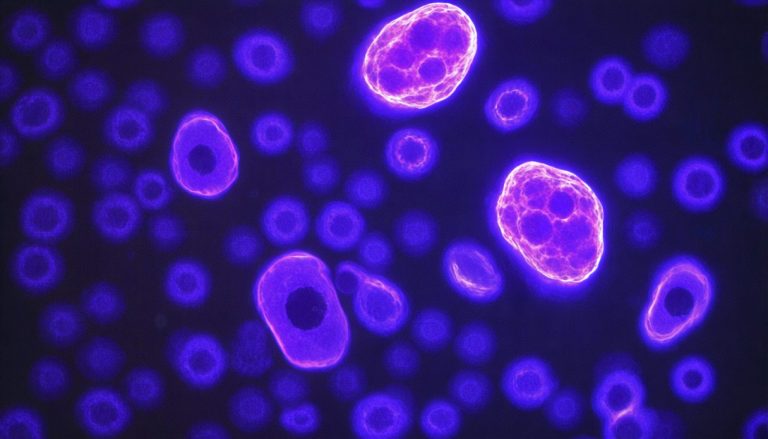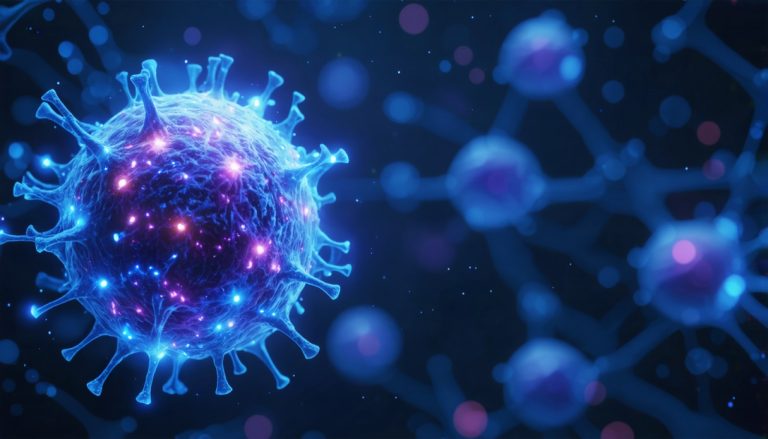
- “Tahoe 100M” is a groundbreaking dataset featuring 100 million single-cell data points and 60,000 experiments.
- The dataset includes observations of 1,100 drug treatments across 50 cancer types, offering extensive insights into tumor cell behavior.
- Developed using the “Mosaic Platform,” it enables dynamic drug testing across multiple cancers, generating detailed cellular data.
- Partnership with the Arc Institute created the Arc Virtual Cell Atlas, promoting open access and collaboration with nearly 11,000 downloads.
- This data is pivotal for AI advancements, supporting the development of precision therapies via minimized batch effects and reliable insights.
- The release of Tahoe 100M emphasizes the importance of open-source data sharing in cancer research, pushing forward AI integration with biology.
When Tahoe Therapeutics rolled out its monumental dataset, “Tahoe 100M,” the world of drug discovery trembled. This groundbreaking collection, available to researchers eager to unravel the mysteries of cancer, consists of over 100 million single-cell data points and 60,000 experiments. The compendium encompasses observations of 1,100 drug treatments across 50 cancer types, offering an unprecedented glimpse into the cellular ballet performed within tumors.
Boldly stepping into the limelight as the largest single-cell repository globally, Tahoe 100M represents a crucial leap forward. Its assembly of “single cell transcriptomics profiles” acts as a living map of gene expression in individual cells, offering researchers a vista of cellular interactions akin to a vibrant mosaic of life under siege. By capturing this intricate tapestry, scientists can now trace the complexities and idiosyncrasies of tumor cell behavior, laying the groundwork for more precise and effective cancer therapies.
Central to this revelation is the “Mosaic Platform” developed by Tahoe’s adept co-founder Dr. Johnny Yu. This pioneering technology dynamically tests drugs across multiple cancer types simultaneously, yielding oceans of data that detail approximately 20,000 measurements per assay. Each reading reveals the dance of protein-coding genes in action, granting unprecedented cellular granularity that fuels both curiosity and discovery.
Tahoe Therapeutics hasn’t journeyed alone. Their collaboration with the Arc Institute birthed the Arc Virtual Cell Atlas, a complementary testament to the power of shared knowledge. This resource flings wide open the gates to public access, with nearly 11,000 downloads reported in a mere month on the collaborative platform, Hugging Face.
In a world increasingly conquered by AI, datasets like Tahoe 100M hold the key to the future. As AI models like AlphaFold 3 break ground in protein structure prediction, Tahoe 100M introduces a new chapter of discovery that prioritizes patient complexity over protein binding simplicity. Dr. Hani Goodarzi and his team have engineered data with minimized “batch effects,” ensuring comparability and reliability that AI models can feast upon.
The implications are vast. Dr. Bo Wang, an AI luminary from the University Health Network, heralds this dataset as a monumental leap for AI engagement in the biological sciences. With a keen eye on training AI systems capable of parsing dosage-dependent responses across a spectrum of cancer types, Dr. Wang’s team anticipates AI models that light the pathway towards early patient stratification and precision treatment selection.
The altruistic release of Tahoe 100M signals a potential tipping point—a spark that might ignite a culture shift towards open-source data sharing in cancer research. This collaborative spirit champions transparency, propelling us one step closer to the dream of an “internet of biology.” Such advancements promise to integrate AI with cellular biology, expediting drug development like never before.
In this relentless pursuit, Tahoe 100M isn’t merely a dataset; it’s a clarion call for cooperation, innovation, and exploration at the nexus of human knowledge and AI potential. This is the dawn of a new era in cancer research, where the veil is lifted, and the dance of life is scrutinized as never before.
Unlocking Cancer’s Secrets: The Revolutionary Impact of Tahoe 100M on Drug Discovery
An In-Depth Look at Tahoe 100M
Tahoe 100M, an impressive dataset presented by Tahoe Therapeutics, has set new benchmarks in the field of cancer research. Comprising over 100 million single-cell data points, the dataset is built on observations from 60,000 experiments that span 1,100 drug treatments across 50 cancer types. This monumental resource provides an unprecedented level of insight into tumor biology.
Key Features and Advantages
– Largest Single-Cell Repository: Tahoe 100M stands as the most extensive single-cell repository globally, facilitating detailed studies on gene expression profiles at an unprecedented scale.
– Mosaic Platform: Developed by Tahoe’s co-founder Dr. Johnny Yu, the Mosaic Platform enables dynamic testing of drugs across various cancer types, producing about 20,000 measurements per assay. This platform is pivotal for understanding the complexities of tumor supply single-cell transcriptomics profiles, painting a comprehensive picture of cellular interactions.
– Minimized Batch Effects: The data management strategies employed by Dr. Hani Goodarzi’s team reduce batch effects, ensuring that the dataset is highly reliable for AI application.
A Partnership with Arc Institute: Arc Virtual Cell Atlas
Collaboratively created with the Arc Institute, the Arc Virtual Cell Atlas complements Tahoe 100M by providing a robust framework for data analysis. With over 11,000 downloads within a month on shared platforms like Hugging Face, it ensures broad accessibility and encourages a culture of open science.
Real-World Applications & AI Integration
– AI-Powered Drug Discovery: Dr. Bo Wang, from the University Health Network, emphasizes the use of AI in interpreting the rich data Tahoe 100M presents. These advancements can lead to AI models capable of parsing dosage-dependent reactions, laying the groundwork for early patient stratification and personalized treatments.
– AI Models and Protein Prediction: While models like AlphaFold 3 focus on protein structure predictions, Tahoe 100M emphasizes understanding patient complexities, enhancing the precision of cancer treatment.
Controversies and Limitations
Despite its potential, the Tahoe 100M’s ambitious scope could pose challenges, such as:
– Data Overload: With such a massive volume of information, researchers might face difficulties in extracting actionable insights without advanced computational resources.
– Bias and Data Quality: Even with minimized batch effects, ensuring data’s consistency and integrity across diverse datasets remains a challenge.
Future Prospects & Industry Trends
– Open-Source Data Movement: Tahoe 100M could initiate more open-source projects in drug discovery, fostering a collaborative spirit that accelerates research and development across the industry.
– AI Integration in Healthcare: The dataset highlights the growing trend of AI adoption in biological sciences, paving the way for innovations in patient care.
Actionable Tips for Researchers
1. Leverage AI Tools: Utilize machine learning algorithms to analyze the complex data Tahoe 100M offers for targeted research outcomes.
2. Embrace Open Collaboration: Engage in collaborative platforms like Hugging Face to enrich data analysis and expand the research network.
3. Prioritize Data Hygiene: Ensure cleanliness and accuracy in data processing to maintain high research standards.
For more information, visit Hugging Face and Arc Institute.
This is a pivotal moment in cancer research and drug discovery, and staying informed about datasets like Tahoe 100M can provide valuable insights and drive innovations in treatment strategies.



